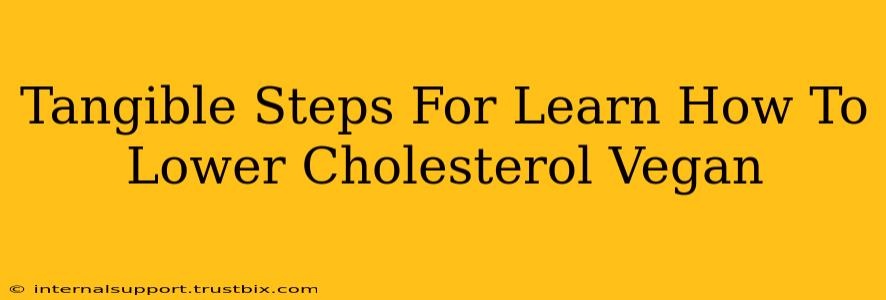Lowering cholesterol on a vegan diet is entirely achievable and offers numerous health benefits. Forget restrictive fad diets; this guide provides actionable steps to naturally reduce your cholesterol levels while embracing the deliciousness of plant-based eating.
Understanding Cholesterol and Vegan Diets
Before diving into specific strategies, let's clarify a few points. While vegan diets are naturally low in LDL ("bad") cholesterol (since it's found in animal products), it's crucial to understand that high cholesterol can stem from various factors, including genetics and lifestyle. A vegan diet significantly impacts dietary cholesterol intake but doesn't automatically negate the need for proactive management. This means focusing on foods that actively support healthy cholesterol levels.
The Role of Plant-Based Nutrition
The beauty of a vegan approach lies in its abundance of cholesterol-lowering nutrients. This includes:
- Soluble Fiber: Found in oats, beans, lentils, and fruits like apples and berries, soluble fiber binds to cholesterol in the digestive tract, preventing its absorption. This is a key player in lowering cholesterol levels.
- Plant Sterols and Stanols: These compounds, present in many plant foods, competitively inhibit cholesterol absorption in the gut. Fortified foods also offer a concentrated source.
- Omega-3 Fatty Acids: While primarily associated with fish, plant-based sources like flaxseeds, chia seeds, and walnuts provide alpha-linolenic acid (ALA), an omega-3 that contributes to heart health.
Practical Steps to Lower Cholesterol on a Vegan Diet
Now, let's get into the actionable steps:
1. Embrace Soluble Fiber Powerhouses
Incorporate these into your daily diet:
- Oats: Start your day with a bowl of oatmeal, or add it to smoothies and baked goods.
- Beans and Lentils: These are nutritional powerhouses, versatile in soups, stews, salads, and as a side dish.
- Fruits (apples, berries, bananas): Enjoy them as snacks or add them to your breakfast and desserts.
Pro Tip: Aim for at least 25-30 grams of fiber daily. Gradually increase your fiber intake to avoid digestive discomfort.
2. Boost Your Intake of Plant Sterols/Stanols
Consider these options:
- Fortified foods: Check labels for foods fortified with plant sterols or stanols, such as yogurt alternatives, margarines, and juices.
- Nuts and seeds: Many nuts and seeds naturally contain these compounds, contributing to overall heart health.
Important Note: While effective, plant sterols/stanols should be consumed as part of a balanced diet, not as a standalone cholesterol-lowering solution.
3. Prioritize Omega-3 Fatty Acids
Include these in your diet regularly:
- Flaxseeds: Add them to smoothies, yogurt, or sprinkle on salads.
- Chia seeds: Use them in puddings, baked goods, or sprinkle on cereals.
- Walnuts: Enjoy them as a snack or incorporate them into salads and trail mixes.
Remember: ALA, the omega-3 from plant sources, is not as directly effective as EPA and DHA (found in fish), but it still contributes to overall cardiovascular health.
4. Limit Saturated and Trans Fats
While vegan diets naturally exclude animal-based saturated fats, be mindful of hidden sources such as:
- Processed vegan foods: Some vegan processed foods can be high in unhealthy fats. Always check nutrition labels.
- Coconut oil: Although a natural fat, coconut oil is high in saturated fat and should be consumed in moderation.
- Deep-fried foods: Avoid excessive consumption of deep-fried vegan foods.
5. Maintain a Healthy Weight
Weight management is crucial for overall cholesterol levels. A vegan diet, combined with regular exercise, can significantly contribute to weight loss or maintenance.
6. Regular Exercise
Incorporate regular physical activity into your routine. This complements a healthy diet in lowering cholesterol and promoting overall well-being.
7. Consult a Healthcare Professional
Crucially, consult your doctor or a registered dietitian before making significant dietary changes, especially if you have pre-existing health conditions. They can provide personalized guidance based on your individual needs and health status.
By following these tangible steps and embracing the delicious world of vegan cuisine, you can effectively lower your cholesterol naturally and pave the way for a healthier, happier you. Remember, consistency is key – these lifestyle changes are investments in your long-term well-being.

